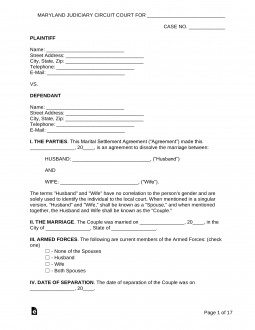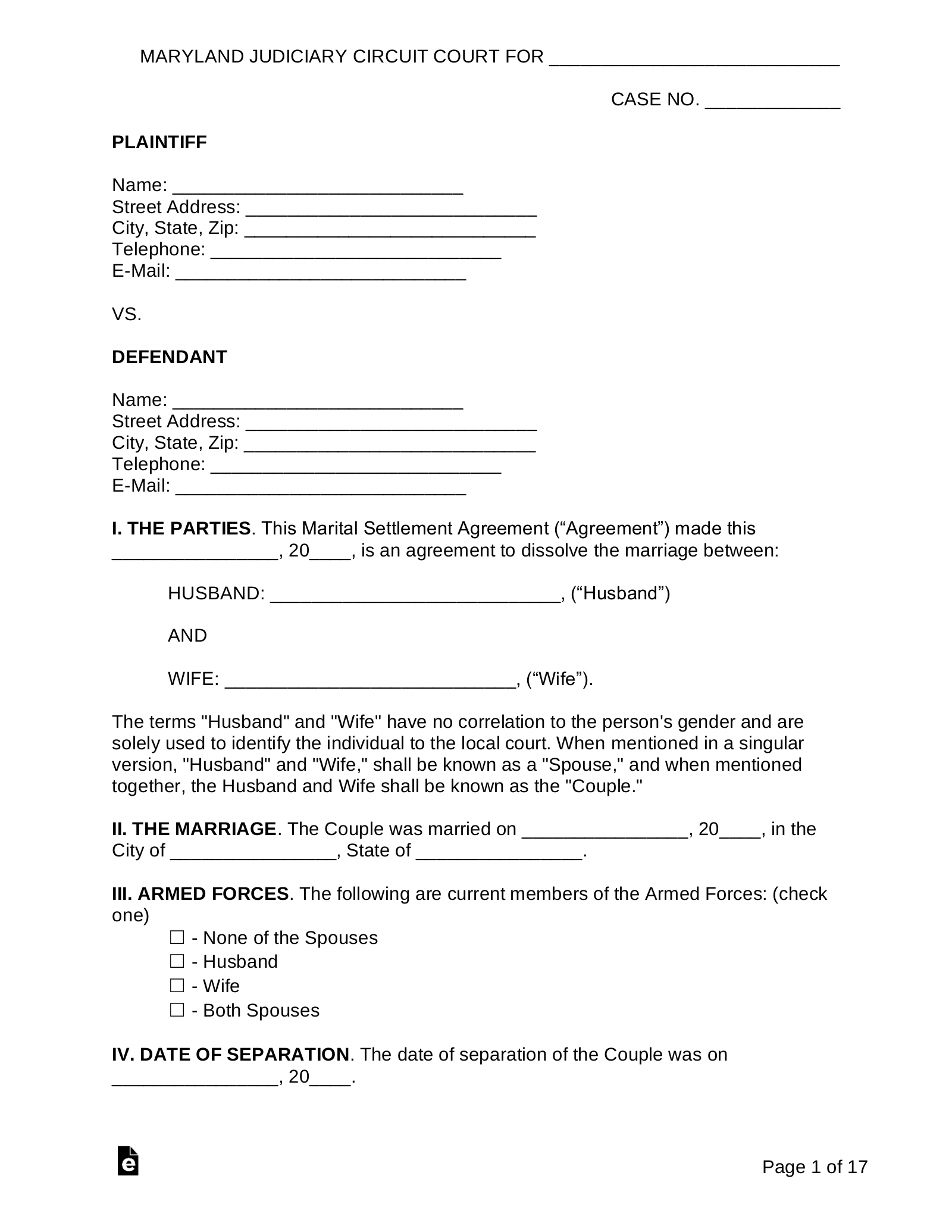Updated February 26, 2024
A Maryland marital settlement agreement is a contract that determines the terms between a couple in dividing their property, assets, and other interests following divorce. If one party is to be awarded alimony, child support, and/or child custody, these terms must be covered in the document as well. By entering into an agreement, the couple can apply for an uncontested divorce, which accelerates the legal process and avoid a scenario in which the judge will determine custodial rights, alimony/child support, and the division of the marital property. Although it is not mandatory, it is recommended that couples obtain legal counsel when drafting a marital settlement agreement to ensure that the contract is fair to both parties and will stand up in court.
Table of Contents |
Divorce Laws
Statutes – Maryland Code, Family Law – Title 7 (Divorce), Title 11 (Alimony), and Title 12 (Child Support)
Alimony (§ 11-106) – In a divorce case, the court may award financial support (alimony) to either party based on the following considerations:
- Alimony-seeking party’s ability to be self-supporting
- Alimony-seeking party’s educational needs
- Standard of living established during their marriage
- Duration of marriage
- Contributions of each party to the well-being of their family
- Circumstances that contributed to the couple’s estrangement
- Each party’s age
- Each party’s physical and mental condition
- Any agreement between the parties
- Each party’s financial needs and resources
- Each party’s financial obligations
- Each party’s retirement benefits
Alimony Calculator – calculators.law, The People’s Law Library of Maryland (Alimony Quiz)
Child Support (§ 12-204) – If the couple has children, one party will be awarded child support payments based on the potential and actual income of both parties, the number of children that they have, estimated childcare and medical expenses, and the amount of time that the children will be in the care of each parent.
Child Support Calculator – Jimeno & Gray
Division of Property (§ 8-205) – Because Maryland is an equitable distribution state, the court will divide the couple’s property in a way that they determine to be equitable and fair. The court will make this determination based on the following:
- Each party’s contributions to the well-being of the family
- Value of each party’s property interests
- Each party’s economic circumstances
- Circumstances that contributed to the estrangement of the parties
- Duration of marriage
- Each party’s age
- Each party’s physical and mental condition
- How and when marital property was acquired
- Each party’s contribution to the acquisition of real property
- Any award of alimony the court has made
Grounds for Divorce (§ 7-103) – In an absolute divorce, the court will legally end the marriage, divide the couple’s property, and determine the custody of the couple’s children by decree. Couples can obtain a “no-fault” divorce (whereby neither party is accused of wrongdoing) on grounds of mutual consent or of separation (by living apart for twelve (12) consecutive months).
Grounds for a fault-based divorce are as follows:
- Adultery
- Desertion
- Conviction of a felony or misdemeanor (with a sentence of at least three (3) years)
- Insanity (if spouse has been in a mental institution for at least three (3) years)
- Cruelty and vicious conduct toward the plaintiff or their minor child
Interim Support (§ 11-106) – The court may award alimony to either party while their case is pending as soon as a plea for financial support is filed.
Residency (§ 7-101) – If the grounds for the divorce occurred outside this state, a party may not apply for a divorce unless one (1) of the parties has resided in-state for at least six (6) months before the application is filed.
Separation (§ 7-103(4)) – To obtain an absolute divorce based on the grounds of separation, the couple must remain separated and not cohabit for twelve (12) consecutive months prior to filing a divorce action.
Divorce Forms
- Where to File – Circuit Court in County of Residence
- Filing Fee – $165 (self-represented) / $185 (with attorney)
- How Long Does it Take? At least sixty (60) days
Uncontested Divorce with No Children:
- CC-DCM-001 – Civil Domestic Case Information Report
- CC-DR-020 – Complaint for Absolute Divorce
- CC-DR-031 – Financial Statement (General)
- CC-DR-033 – Joint Statement of Parties Concerning Marital and Non-Marital Property
- CC-DR-050 – Answer to Complaint/Petition/Motion
- CC-DR-055 – Affidavit of Service (Private Process)
- CC-DR-056 – Affidavit of Service (Certified Mail Restricted Delivery-Receipt Requested)
- CC-DR-058 – Certificate of Service
- CC-DR-059 – Request for Hearing or Proceeding
- CC-DR-094 – Counter-Complaint for Absolute Divorce
- CC-DR-097 – Motion for Restoration of Former Name
- CC-DRIN-A – Instructions for Completing and Filing Divorce Forms
- CC-DC-089 – Waiver of Prepayment of Prepaid Costs
- Writ of Summons (Obtained from Circuit Court)
- Decree of Absolute Divorce (Obtained from Circuit Court)
Uncontested Divorce With Children:
- CC-DCM-001 – Civil Domestic Case Information Report
- CC-DR-020 – Complaint for Absolute Divorce
- CC-DR-031 – Financial Statement (General)
- CC-DR-033 – Joint Statement of Parties Concerning Marital and Non-Marital Property
- CC-DR-050 – Answer to Complaint/Petition/Motion
- CC-DR-055 – Affidavit of Service (Private Process)
- CC-DR-056 – Affidavit of Service (Certified Mail Restricted Delivery-Receipt Requested)
- CC-DR-058 – Certificate of Service
- CC-DR-059 – Request for Hearing or Proceeding
- CC-DR-094 – Counter-Complaint for Absolute Divorce
- CC-DR-097 – Motion for Restoration of Former Name
- CC-DRIN-A – Instructions for Completing and Filing Divorce Forms
- CC-DC-089 – Waiver of Prepayment of Prepaid Costs
- CC-DR-109 – Maryland Parenting Plan Tool
- CC-DRIN-109 – Maryland Parenting Plan Instructions
- Writ of Summons (Obtained from Circuit Court)
- Decree of Absolute Divorce (Obtained from Circuit Court)
How to File for Divorce in Maryland (6 steps)
- Complete and File Divorce Papers with Circuit Court
- Serve Defendant
- Defendant’s Response
- File Additional Forms
- Request for Hearing
- Final Hearing and Absolute Divorce Decree
1. Complete and File Divorce Papers with Circuit Court

To legally terminate a marriage in Maryland, one spouse (the plaintiff) will need to file for an “absolute divorce” by filling out and signing the Civil Domestic Case Information Report, Complaint for Absolute Divorce, and Financial Statement. Once completed, these forms must be filed with the circuit court for the county or city in which the plaintiff or their spouse (the defendant) resides. The plaintiff will be charged a filing fee of at least $165 unless they file a Waiver of Prepayment of Prepaid Costs to waive the fees.
2. Serve Defendant
After the divorce papers have been filed, the court will send the plaintiff a Writ of Summons that they must arrange to be served on the defendant by a third party, along with copies of all the filed divorce papers. The summons will relay Service must be performed within sixty (60) days from the summons date.
Listed below are the three (3) accepted methods whereby the plaintiff may serve the documents.
- By sheriff’s office in the county where the defendant lives (fee required)
- By private process server
- By adult (over eighteen (18) years old) who is not a party to the case (in person or by certified mail)
After delivering the divorce papers, the server must fill out the Affidavit of Service Private Process (if delivered by hand) or Affidavit of Service Certified Mail and return it to the plaintiff to file with the court clerk (the sheriff’s office will file their own affidavit).
3. Defendant’s Response
The defendant will have thirty (30) days after the date of service to file an Answer to Complaint or Counter-Complaint for Absolute Divorce in response to their spouse’s complaint. The counter-complaint is only used if the defendant alleges that there are additional grounds for divorce that were not included in the plaintiff’s complaint.
4. File Additional Forms

The following forms must be completed and filed by both parties before the divorce hearing takes place:
- Marital Settlement Agreement (required if the grounds are mutual consent)
- Joint Statement of Parties Concerning Marital and Non-Marital Property (required in all cases)
- Parenting Plan (required if the couple has children)
- Motion for Restoration of Former Name (optional – to legally restore a former name)
5. Request for Hearing
Once all the required paperwork has been filed by both parties, the plaintiff can complete and file a Request for Hearing or Proceeding to proceed to the final hearing without further delay. If the couple has reached an agreement, the plaintiff should select the “uncontested hearing” option. The court clerk will schedule a hearing and give the plaintiff a notice of hearing that they, in turn, must deliver to the defendant.
6. Final Hearing and Absolute Divorce Decree

Both parties must arrive at the divorce hearing on time in order to be heard by the court. If the divorce is based on the grounds of mutual consent, the judge will review the uncontested complaint and issue a Judgment or Decree of Absolute Divorce (some counties may require the plaintiff to prepare this form). If the couple is in disagreement, the court will review both sides of the case before entering a judgment. Once the judgment/decree is entered by the judge, the divorce is final. If either spouse entered a motion to have their name restored, their name will be legally restored. Following the divorce, if either party wishes to change their name, they will need to file a Petition for Name Change with their circuit court.


